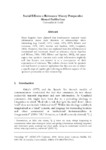Mostrar o rexistro simple do ítem
Social Effects: a Relevance Theory Perspective
| dc.contributor.author | Padilla Cruz, Manuel | |
| dc.date.accessioned | 2016-07-15T08:35:33Z | |
| dc.date.available | 2016-07-15T08:35:33Z | |
| dc.date.issued | 2008 | |
| dc.identifier.citation | AEDEAN 2008, 31: 699-709 ISBN-978-84-9749-278-2 | |
| dc.identifier.isbn | 978-84-9749-278-2 | |
| dc.identifier.uri | http://hdl.handle.net/2183/17083 | |
| dc.description.abstract | [Abstract] Many linguists have claimed that interlocutors transmit social information about their identities or relationships when interacting (e.g. Lakoff, 1973; Laver, 1974, 1975; Brown and Levinson, 1978, 1987; Scollon and Scollon, 1995; Coupland, 2000). However, they have not explained how this information is transmitted and recovered. Based on relevance theory (Sperber and Wilson, 1986, 1995; Wilson and Sperber, 2002), this paper argues that speakers transmit such social information implicitly and that hearers can recover it as a consequence of their expectations of relevance. The stylistic choices made by speakers can lead hearers to recover implicatures that they can use to obtain a specific type of cognitive effect referring to different aspects of the speakers’ personality or their relationship. | |
| dc.language.iso | eng | |
| dc.publisher | Universidade da Coruña | |
| dc.title | Social Effects: a Relevance Theory Perspective | |
| dc.type | info:eu-repo/semantics/conferenceObject | |
| dc.rights.access | info:eu-repo/semantics/openAccess |






